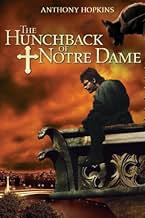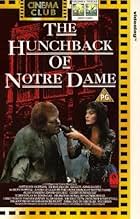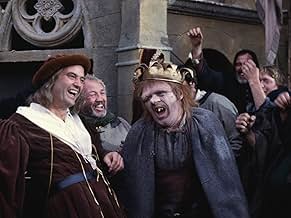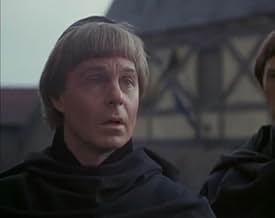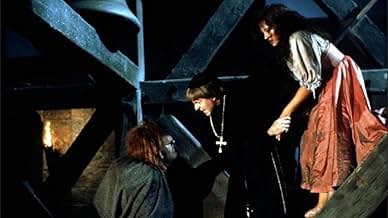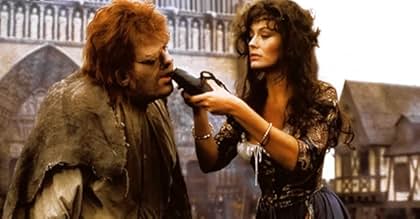Il gobbo di Notre Dame
Titolo originale: The Hunchback of Notre Dame
VALUTAZIONE IMDb
6,3/10
1536
LA TUA VALUTAZIONE
Aggiungi una trama nella tua linguaDisfigured man Quasimodo (Sir Anthony Hopkins) is feared and tormented by the townspeople of Notre Dame, but he has a sensitive nature of which few are aware.Disfigured man Quasimodo (Sir Anthony Hopkins) is feared and tormented by the townspeople of Notre Dame, but he has a sensitive nature of which few are aware.Disfigured man Quasimodo (Sir Anthony Hopkins) is feared and tormented by the townspeople of Notre Dame, but he has a sensitive nature of which few are aware.
- Regia
- Sceneggiatura
- Star
- Candidato a 1 Primetime Emmy
- 1 candidatura in totale
Recensioni in evidenza
This glossy US television version of The Hunchback of Notre Dame followed a well worn formula of that era.
Round up as many well known British thespians who prefer theatre and shower them with money to appear.
Get a few veterans who have an Oscar for a little cameo. So that's Sir John Gielgud sorted.
He is not the only knight in this movie, others would get one later. Sir Nigel Hawthorne has a small role. The main parts are reserved for Sir Derek Jacobi as the priest Frollo who is bewitched by gypsy woman Esmeralda (Lesley-Anne Down.)
Quasimodo (Sir Anthony Hopkins) is the disfigured hunchback who is mocked by the people of Notre Dame.
Strangely Quasimodo has a reduced role here. He only appears sporadically in the first half of the movie.
The film steps up the moment Frollo glimpses Esmeralda and is enchanted by her. It drives him to madness and cruelty.
This is certainly a more campy reworking than one that should had been a gothic horror/romance. In that sense it wasted its cast.
Interestingly two fishwives who appear, Pam St Clement and June Brown would later find fame in Eastenders.
Round up as many well known British thespians who prefer theatre and shower them with money to appear.
Get a few veterans who have an Oscar for a little cameo. So that's Sir John Gielgud sorted.
He is not the only knight in this movie, others would get one later. Sir Nigel Hawthorne has a small role. The main parts are reserved for Sir Derek Jacobi as the priest Frollo who is bewitched by gypsy woman Esmeralda (Lesley-Anne Down.)
Quasimodo (Sir Anthony Hopkins) is the disfigured hunchback who is mocked by the people of Notre Dame.
Strangely Quasimodo has a reduced role here. He only appears sporadically in the first half of the movie.
The film steps up the moment Frollo glimpses Esmeralda and is enchanted by her. It drives him to madness and cruelty.
This is certainly a more campy reworking than one that should had been a gothic horror/romance. In that sense it wasted its cast.
Interestingly two fishwives who appear, Pam St Clement and June Brown would later find fame in Eastenders.
This was a film that I sought out as I really enjoyed the original version of this story that was done as a silent film. I decided to check out the other versions. What was interesting about this one is that it is made for TV movie back in the early 80's. The synopsis is a disfigured man Quasimodo (Anthony Hopkins) is feared and tormented by the townspeople of Notre Dame, but he has a sensitive nature of which few are aware.
We start this off inside of the church Notre Dame. A hideous baby is found and the nuns believe that there are devils within it. A priest, Dom Claude Frollo (Derek Jacobi) decides to make him his ward and allow him to live in the church. We shift to 15 years later. Frollo is made an archdeacon and he goes around with Philippe (Tim Pigott-Smith). In the city there is a gypsy woman, Esmeralda (Lesley-Anne Down) who is dancing for money and she's being arrested. When Frollo sees her, he lets her off with a warning.
This day is the start of a festival. One of the most important aspects is crowning the king of fools. Pierre Gringoire (Gerry Sundquist) is a poet who wants to put on a play, but the people aren't really interested. They are trying to find the ugliest man and that is solved when Quasimodo shows up. He is crowned and then scolded by Frollo. He tells him to go back to the cathedral. Also during this, Esmeralda is forced to dance again by her brother, Clopin Trouillefou (David Suchet) and she is arrested. Frollo intervenes and takes her to Notre Dame.
It is there he comes on to her and she flees. He sends Quasimodo after her. Phoebus (Robert Powell) shows up and takes the hunchback into custody. Esmeralda immediately falls in love with this man. Phoebus tells her to meet him at a tavern later that night. Pierre stumbles into the kingdom of thieves where they are going to execute him. That is until Esmeralda agrees to marry him instead of his life being taken. It is after though she tells him that she doesn't see him as a lover. She heads off to meet with Phoebus.
Things take a turn when Frollo goes there to kill Phoebus. The crime is blamed on Esmeralda and she is sentenced to death, even though Phoebus survived. Quasimodo does save her from execution, but now she is kept in Notre Dame, Frollo is also inside with them.
Now I will start off stating I debated whether or not to review this film or not. This one toned down the horror quite a bit to focus more on the love story. That is not to say there aren't horrific elements to the film though. It also does bring up some relevant concepts that are still an issue today as well.
The most glaring one is the right of a woman to choose and the idea of toxic masculinity. Esmeralda falls for Phoebus, because he is good looking and he's a prominent member of the city guard. Pierre is overall a good guy, but he tells Esmeralda not to go meet him because he is a womanizer. I don't like that he is forbidding her at first, but it is her decision. He does have the best intentions for her and will treat her right though.
Even more toxic masculinity is Phoebus and Frollo. The former is really a womanizer and just wants to sleep with her. He is committing adultery as well. Frollo is a man of God, but he is in love with the beauty of Esmeralda. The problem here is that he doesn't take no for an answer and he claims she is a witch for causing him to fall in love. This brings up a big issue I have with religion for sure as he can't take any responsibility for his actions.
It is also a shame though that Quasimodo looks the way he does. He really treats her best, outside of trying to kidnap her because he is told to by Frollo. Quasimodo is convicted of a crime against her and when she shows compassion, he does the same. I do have an issue with this film that we don't get as much Quasimodo as I would like. The story is about him, but this one focuses quite a bit more on this love issue between all of the parties I outlined.
Being that this is a television film, I do think it has some pretty good pacing. I never got bored with what was going on, even though it is a story that I already know. The tension of the film is built through the torture of Esmeralda and just the dread all of these men as they push their will on to her. She is just trying to make money and surviving in the only ways that she can. The failing of the courts is something else that adds to that as well. I liked the ending and though it was fitting for the story that we got.
Something I thought was really good for this one was the acting. Hopkins doesn't have a lot of lines, but I can see why he is a master at the craft. He conveyed the character so well and I thought the way he moved and spoke were perfect of a character like this. Jacobi was solid and I love the corruption of religion that happens with him the moment he sees Esmeralda. The interesting thing is that he did do a good deed of taking in Quasimodo. It doesn't excuse him, but we do get that redeeming factor. Suchet was fine as was Sundquist. Down was quite beautiful and I thought her portrayal of Esmeralda was solid. The rest of the cast rounded out the film for what was needed as well.
To the effects of the film, they did go pretty light on them. This one doesn't really need a whole lot to be honest. The look of Quasimodo was good. I thought it was pretty realistic. I do like it was done practical. That comes from the time period, but if done today, it would probably be CGI. The torture scene of Esmeralda did make me cringe so I give credit there. I do think the film was shot well also.
Now with that said, I thought this film was fine. It isn't as good as the other two versions I've seen at this time though. I think some of the aspects of the story that were taken out hurts this one. This one focuses more on the love angle instead of the social commentary of science vs. religion. The acting though is good and the little effects we get are as well. It is paced well also. The soundtrack of the film really didn't stand out and it didn't hurt it either. I did find this version to be enjoyable, just not better than some of the others one. I would actually recommend this if you want one that is a bit lighter on the horror as I do think this one is above average overall.
We start this off inside of the church Notre Dame. A hideous baby is found and the nuns believe that there are devils within it. A priest, Dom Claude Frollo (Derek Jacobi) decides to make him his ward and allow him to live in the church. We shift to 15 years later. Frollo is made an archdeacon and he goes around with Philippe (Tim Pigott-Smith). In the city there is a gypsy woman, Esmeralda (Lesley-Anne Down) who is dancing for money and she's being arrested. When Frollo sees her, he lets her off with a warning.
This day is the start of a festival. One of the most important aspects is crowning the king of fools. Pierre Gringoire (Gerry Sundquist) is a poet who wants to put on a play, but the people aren't really interested. They are trying to find the ugliest man and that is solved when Quasimodo shows up. He is crowned and then scolded by Frollo. He tells him to go back to the cathedral. Also during this, Esmeralda is forced to dance again by her brother, Clopin Trouillefou (David Suchet) and she is arrested. Frollo intervenes and takes her to Notre Dame.
It is there he comes on to her and she flees. He sends Quasimodo after her. Phoebus (Robert Powell) shows up and takes the hunchback into custody. Esmeralda immediately falls in love with this man. Phoebus tells her to meet him at a tavern later that night. Pierre stumbles into the kingdom of thieves where they are going to execute him. That is until Esmeralda agrees to marry him instead of his life being taken. It is after though she tells him that she doesn't see him as a lover. She heads off to meet with Phoebus.
Things take a turn when Frollo goes there to kill Phoebus. The crime is blamed on Esmeralda and she is sentenced to death, even though Phoebus survived. Quasimodo does save her from execution, but now she is kept in Notre Dame, Frollo is also inside with them.
Now I will start off stating I debated whether or not to review this film or not. This one toned down the horror quite a bit to focus more on the love story. That is not to say there aren't horrific elements to the film though. It also does bring up some relevant concepts that are still an issue today as well.
The most glaring one is the right of a woman to choose and the idea of toxic masculinity. Esmeralda falls for Phoebus, because he is good looking and he's a prominent member of the city guard. Pierre is overall a good guy, but he tells Esmeralda not to go meet him because he is a womanizer. I don't like that he is forbidding her at first, but it is her decision. He does have the best intentions for her and will treat her right though.
Even more toxic masculinity is Phoebus and Frollo. The former is really a womanizer and just wants to sleep with her. He is committing adultery as well. Frollo is a man of God, but he is in love with the beauty of Esmeralda. The problem here is that he doesn't take no for an answer and he claims she is a witch for causing him to fall in love. This brings up a big issue I have with religion for sure as he can't take any responsibility for his actions.
It is also a shame though that Quasimodo looks the way he does. He really treats her best, outside of trying to kidnap her because he is told to by Frollo. Quasimodo is convicted of a crime against her and when she shows compassion, he does the same. I do have an issue with this film that we don't get as much Quasimodo as I would like. The story is about him, but this one focuses quite a bit more on this love issue between all of the parties I outlined.
Being that this is a television film, I do think it has some pretty good pacing. I never got bored with what was going on, even though it is a story that I already know. The tension of the film is built through the torture of Esmeralda and just the dread all of these men as they push their will on to her. She is just trying to make money and surviving in the only ways that she can. The failing of the courts is something else that adds to that as well. I liked the ending and though it was fitting for the story that we got.
Something I thought was really good for this one was the acting. Hopkins doesn't have a lot of lines, but I can see why he is a master at the craft. He conveyed the character so well and I thought the way he moved and spoke were perfect of a character like this. Jacobi was solid and I love the corruption of religion that happens with him the moment he sees Esmeralda. The interesting thing is that he did do a good deed of taking in Quasimodo. It doesn't excuse him, but we do get that redeeming factor. Suchet was fine as was Sundquist. Down was quite beautiful and I thought her portrayal of Esmeralda was solid. The rest of the cast rounded out the film for what was needed as well.
To the effects of the film, they did go pretty light on them. This one doesn't really need a whole lot to be honest. The look of Quasimodo was good. I thought it was pretty realistic. I do like it was done practical. That comes from the time period, but if done today, it would probably be CGI. The torture scene of Esmeralda did make me cringe so I give credit there. I do think the film was shot well also.
Now with that said, I thought this film was fine. It isn't as good as the other two versions I've seen at this time though. I think some of the aspects of the story that were taken out hurts this one. This one focuses more on the love angle instead of the social commentary of science vs. religion. The acting though is good and the little effects we get are as well. It is paced well also. The soundtrack of the film really didn't stand out and it didn't hurt it either. I did find this version to be enjoyable, just not better than some of the others one. I would actually recommend this if you want one that is a bit lighter on the horror as I do think this one is above average overall.
This film shows us why derek jacobi is one of the greatest actors living. only he can turn a villian into the most sympathetic character in a film. his claude frollo bristles with lust, simmers with hate and all the while he feels tortured and guilty. still he can't resist his urges. he loves quasimodo but loves his own carnal pursuits more. this is indeed a tragic figure. Hopkins is also outstanding in the role of quasimodo,he is sicere and honest. david suchet and leslie anne-down offer strong support.
With every different version of "The Hunchback of Notre Dame" that I have ever seen, I hope again that I will one day see a film that copies the novel exactly. Victor Hugo's novel is a tragedy all the way, and it does NOT have a happy ending, or even a semi-happy one! The only version that is most like "Notre Dame de Paris" is the 1977 film described elsewhere in this site. However, the 1982 version comes closer than the earlier ones, which, because of censorship, could not have an Archbishop feverishly pursuing a heathen gypsy female through the dark streets of Paris, laying aside his priestly vows to lust after her to the death. This dark, Gothic romance cries out for black and white--it just doesn't work in color, and the color here is gorgeous. See the 1939 Laughton version to see what I mean. And speaking of the Laughton version, Anthony Hopkins is obviously copying Charles Laughton's legendary performance, and does it quite well--one great actor's nod to another. Has Anthony Hopkins ever given a bad performance? Or has Derek Jacobi, for that matter? He succeeds in making Dom Claude what I have always considered this character to be--not a villain, but a pathetic, pitiable character torn between his holy vows and his forbidden lust for a beautiful gypsy dancer. Lesley-Ann Down is lovely, to say the least, as Esmeralda, and the supporting cast is solid. David Suchet as Clopin is fine in his own way, but it was a thankless task to try to follow Thomas Mitchell's great, over-the-top turn as the King of the Beggars in the 1939 version. Though this version is not as good as it could have been, it still is one of the best, and well worth your time.
THE HUNCHBACK OF NOTRE DAME (1982) turns out be the first time I've watched a filmed adaptation of the Victor Hugo novel. It's just something I've never got around to before now, despite owning both the silent version and the Charles Laughton outing on video. I guess it says something about my tastes in film when I've watched Paul Naschy's HUNCHBACK OF THE MORGUE before this story! As it happens, HUNCHBACK OF NOTRE DAME turns out to be a fairly decent film, although I can't vouch for how faithful it is as I haven't read the novel. Despite being a made-for-TV production, it's eventful and intriguing, mainly worth watching for a superior cast who acquit themselves well with the material.
Anthony Hopkins, in the titular role, plays it for sympathy and it works. He's virtually unrecognisable beneath the heavy and effective makeup, and his hunchback is a tragically maligned character throughout. Lesley-Anne Down is a believable object of lust and affection for most of the cast, and Derek Jacobi has a fine line in playing villainous characters (his turn as Claudius in Branagh's HAMLET was another favourite).
Watch out for minor roles for David Suchet (with hair!), Tim Pigott-Smith, John Gielgud, Nigel Hawthorne and Robert Powell, who's wasted in a minor part. Also watch out for decent production values, with elaborate sets, and assured direction from TV helmsman Michael Tuchner. I wouldn't necessarily call this depiction of the novel definitive - it feels a little slow and stagy in places, a little cold - but it is a solidly entertaining picture.
Anthony Hopkins, in the titular role, plays it for sympathy and it works. He's virtually unrecognisable beneath the heavy and effective makeup, and his hunchback is a tragically maligned character throughout. Lesley-Anne Down is a believable object of lust and affection for most of the cast, and Derek Jacobi has a fine line in playing villainous characters (his turn as Claudius in Branagh's HAMLET was another favourite).
Watch out for minor roles for David Suchet (with hair!), Tim Pigott-Smith, John Gielgud, Nigel Hawthorne and Robert Powell, who's wasted in a minor part. Also watch out for decent production values, with elaborate sets, and assured direction from TV helmsman Michael Tuchner. I wouldn't necessarily call this depiction of the novel definitive - it feels a little slow and stagy in places, a little cold - but it is a solidly entertaining picture.
Lo sapevi?
- QuizQuasimodo's make-up took five hours. Sir Anthony Hopkins was required to report to the set at 3 a.m.
- BlooperThe number of coins in Esmeralda's tambourine as she dances.
- ConnessioniEdited into Hallmark Hall of Fame (1951)
I più visti
Accedi per valutare e creare un elenco di titoli salvati per ottenere consigli personalizzati
Dettagli
- Data di uscita
- Paesi di origine
- Sito ufficiale
- Lingua
- Celebre anche come
- Hallmark Hall of Fame: The Hunchback of Notre Dame (#31.2)
- Luoghi delle riprese
- Aziende produttrici
- Vedi altri crediti dell’azienda su IMDbPro
Contribuisci a questa pagina
Suggerisci una modifica o aggiungi i contenuti mancanti

Divario superiore
By what name was Il gobbo di Notre Dame (1982) officially released in India in English?
Rispondi
